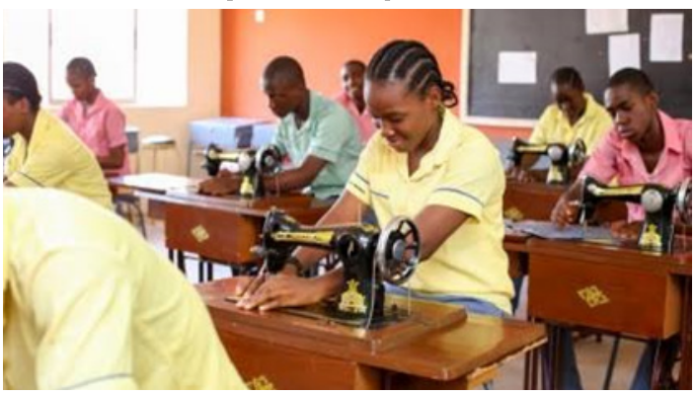It may not sound good to the ears but it continues to worry Nigerians when it is being discussed that despite the large number of university graduates in the labour market that majority of them are unemployable. Could it be true? Some may ask.
A critical look at the matter, clearly shows that something must be wrong somewhere, in a recent research it was proved that most Nigerian graduates are unemployable because they lack an employable skills. These skills are the skills that could guarantee employment.
The researchers also went ahead to list some of the causes of graduate unemployment in Nigeria to include – lack of employable skills, no emphasis on entrepreneurship in the school curriculum, quality of training not in sync with the situation in the society.
Others include lack of criterion for job experience with years of experience which is not favourable to the young graduates and one other reason is that lecturers in our universities do not possess current knowledge of what is happening around them and needed knowledge update.
In line with these, recently, the Executive Secretary of the National Board for Technical Education (NBTE), Mr. Idris Bugaje said that university education risks losing its value in a decade or two without a skill-driven curriculum.
Idris Bugaje made this revelation when the NBTE met with the House of Representatives committee in Kaduna to discuss findings, staffing and other challenges facing the board.
Bugaje said at the meeting that skills development remains a top priority in the Agenda of the NBTE, adding that youth empowerment through Skill Acquisition should replace Nigeria’s culture of social palliatives.
The NBTE secretary warned that universities will become obsolete in 10 or 20 years without skill-based curriculum, adding that skill acquisition is the way to go, pointing out that palliatives is like giving somebody fish. “If you teach someone how to fish, he will be self-sufficient”. He said that the whole world is moving toward skills acquisition . If somebody has a degree without skills, nobody would employ him. But somebody with skills, even without a degree, can employ himself, saying that in the next 10 to 20 years, university education will become irrelevant, unless there is a paradigm shift.
According to him, the world has changed and it is only in Nigeria that we have the mentality of degrees. He said that China has converted 600 varsities to polytechnics because they do not deliver on skills, stressing that that is the way to go.
When Lifestyle took this matter to the public domain, people had various opinions on the issue. Mr. Victor Akabogu, a retired public servant said that he was not surprised that some Nigerian graduates are unemployable because of their mode of training. He said that the school curriculum in Nigeria is vague and full of theories and no skill, and the students learn nothing when they come out, and so “on what basis will they be employed? Also they do not have the skills to employ themselves”. He supported the view that skill acquisition should be introduced into the school curriculum, otherwise, he pointed out that, “the value of degrees from our universities would be worthless “.
Mr. Akabogu said that knowledge does much more than just help students in their thinking skills, but it actually makes learning easier. He also said that skill acquisition in some areas such as tailoring, fashion designing, barbing, carpentry, phone repairs, baking, hairdressing, soap making, agriculture amongst others, can empower the youths meaningfully and help generate employment and reduce unemployment in the country.
He also stated that one of the main issues facing Nigerian graduates is that much emphasis is being laid on academic excellence to the detriment of skill acquisition.
Also speaking, Madam Florence Adigwe, a fashion designer, said that skill acquisition are very necessary in life because they allow one to improve on attributes and qualities vital for an effective workplace performance. She said that skills acquisition makes it easier for people to initiate their own businesses which helps in tackling the unemployment issue.
She said that skills fuels innovation and creativity by broadening individuals’ perspectives and enable them to solve problems from different angles.
She explained that skills acquisition is not only about professional success, but also contributes significantly to personal growth and fulfilment. She said learning new skills fosters a sense of accomplishment and boosts self-confidence and also opens doors to new experiences and opportunities to enrich one’s life.
On the whole and looking at the merits of all, it is wise for the authorities to consider the degree with a mixture of skills as proffered by the secretary of the National Board for Technical Education; Mr. Idris Bugaje. This is because education provides knowledge and understanding while skills are the practical application of that knowledge. Both are valuable and necessary for success in various aspects of life.
It is necessary to note too that a skill shortage often results in reduced productivity. A combination of knowledge and skills can do the magic of high productivity and economic growth. Bugaje’s suggestion should be seriously considered as the nation and citizens stand to gain by it.
Gladly, as the basic education’s new curriculum is billed to commence in January 2025, it is hoped that the issue of skills acquisition will be put in the front burner. The Minister of Education, Professor Tahir Mamman had disclosed that a new curriculum for secondary school education would commence in September, 2025.


